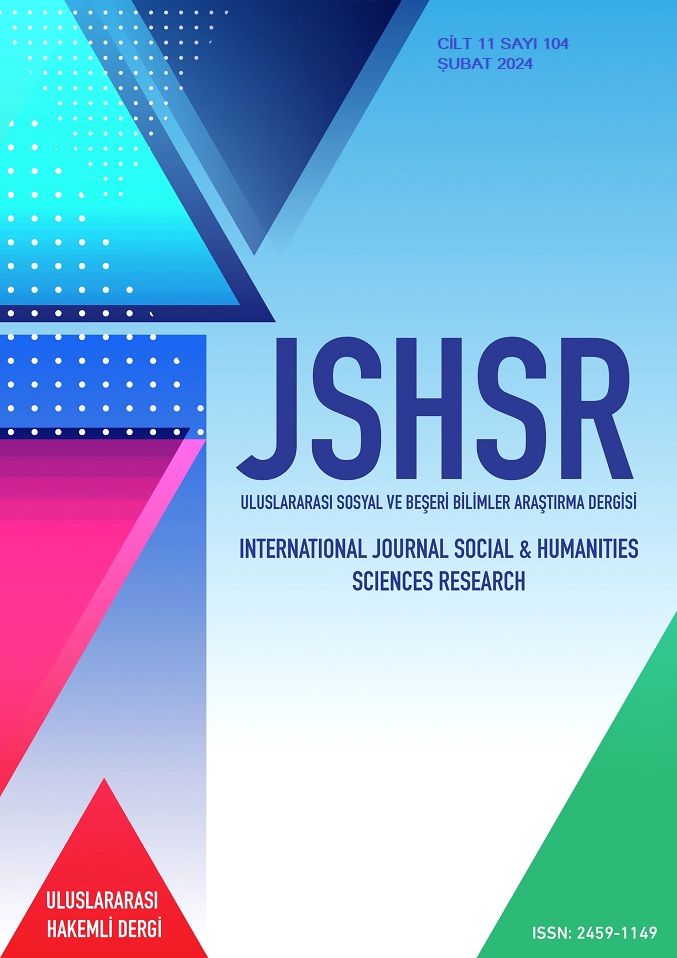Coding Trainings and Robotics Programming in Education and Training Systems
DOI:
https://doi.org/10.5281/zenodo.10775059Keywords:
Programming, Software, Writing CodeAbstract
The development of countries, their economic independence and their survival are directly proportional to the characteristics of the people they will raise. The future of societies depends on the creative people they raise and the products they produce. It is very important to identify these creative people and the original works they will produce at an early age. For this reason, education systems are among the most important systems of every country. Countries that organize their education systems to meet the needs of the age can identify students with creative abilities at an early age and develop creative thinking skills in these children much more easily. The purpose of coding and programming training to be given to students should be to explain the necessity of this training and to raise their awareness about being productive, rather than to train engineers or scientists. In this study, general definitions about coding, coding, programming and software were made, and master's theses and scientific articles were examined using the descriptive analysis method regarding their importance for students. The information obtained as a result of the analysis of the data was written in the findings section. According to the findings, coding and programming training has an important place for the future of every country, these trainings should be started at an early age, it provides children with problem-solving skills, the ability to look at events from a different perspective, increases academic success, collaborative learning, motivation and motivation for lessons. It has been observed that interest has increased. However, it was concluded that there were insufficient workshops in schools, lack of equipment, problems with technological infrastructure and teacher training.
References
Akdoğan, E.E. (2020). Eğitsel Robotik Kodlama Dersi Veren Öğretmenlerin Öğretim Programındaki Kazanımları. [Yayımlanmamış Yüksek Lisans Tezi], Uludağ Üniversitesi Eğitim Bil. Enstitüsü.
Alimisis, D. (2013). Educational robotics: Open questions and new challenges. Themes in Science and Technology Education, 6 (1), 63–71.
Balanskat, A., ve Engelhardt, K. (2014). Computing our future: Computer programming and codingpriorities. school curricula and initiatives across Europe. European Schoolnet.
BTE Derneği (2013). Ne oldu, ne oluyor, ne olacak? http://www.bte.org.tr/belge/ne_oldu_ne_oluyor_ne_ olacak_BTE_dernegi.
Bozpolat, E. & Topdağı, M. (2022). İlkokulda Temel Algoritma ve Kodlama Eğitimine Yönelik Bir İhtiyaç Analizi. MANAS Sosyal Araştırmalar Dergisi, 11(3), 933-957.
Corbin, J., & Strauss, A. (2008). Basics of Qualitative Research: Techniques and Procedures for Developing Grounded Theory (3rd ed.). Thousand Oaks, CA: Sage
Çetin, İ. & Toluk Uçar, Z. (2017). Bilgi İşlemsel Düşünme Tanımı ve Kapsamı. Y. Gülbahar (Ed.), Bilgi İşlemsel Düşünmeden Programlamaya (ss. 41-74) içinde. Pegem Akademi Yayıncılık.
Demirer, V. & Sak, N. (2016). Programming Education and New Approaches Around The World and in Turkey / Dünyada ve Türkiye’de Programlama Eğitimi ve Yeni Yaklaşımlar. Eğitimde Kuram Ve Uygulama. Dergipark, 12(3), 521-546.
European Commission (2014). Coding- The 21st Century Skill. European Commission.
Euronews (2015). Avrupa'da bilgisayar programlama dersleri ilköğretim müfredatına giriyor. https://tr.euronews.com/2015/09/03/avrupa-da-bilgisayar-programlama-dersleri-h2125.html.
Gümüş, İ., (2019). İlkokul Öğrencilerinin Robotik Okuryazarlık Eğitimine Yönelik Görüşlerinin Değerlendirilmesi. Academia.edu.
Hatısaru, S. (2016). Vodafone’dan çocuklara kod yazma dersi. Milliyet. https://www.milliyet.com.tr/ yazarlar/songul-hatisaru/vodafone-dan-cocuklarakod-yazma-dersi-2241732.
Haymana, İ., & Özalp, D. (2020). Robotik ve Kodlama Eğitiminin İlkokul 4. Sınıf Öğrencilerinin Yaratıcı Düşünme Becerilerine Etkisi. İstanbul Aydın Üniversitesi Eğitim Fakültesi Dergisi, 6(2), 247-274.
HITSA, (2018). Information Technology Foundation for Education (HITSA). ProgeTiger Programme.
Hour of Code, (2018). Hour of Code Sık Sorulan Sorular
İşman, A. (2011). Uzaktan Eğitim. Pegem Akademi.
Kanbul, S. & Uzunboylu, H. (2017). Importance of coding education and robotic applications for achieving 21st-century skills in north cyprus. International Journal Of Emerging Technologies In Learning (IJET), 12(1), 130-140.
Kahraman, B. (2015). Avustralya’da ilkokullarda programcılık eğitimi. http://www.webtekno.com/ sektorel/avustralya-da-ilkokullardaprogramcilik-egitimi-veriliyor-h10859.html.
Kafai, Y. B. & Burke, Q. (2014). Connected code: Why children need to learn programming. Cambridge: Mit Press.
MEB-TTKB, (2015). Bilişim Teknolojileri ve Yazılım Dersi Programı. Talim Terbiye Kurulu Başkanlığı.
MEB. (2018). Bilişim teknolojileri ve yazılım dersi (ilkokul 1, 2, 3 ve 4. sınıflar) öğretim programı. http://mufredat.meb.gov.tr/Dosyalar/2018813171732131-42018
Milli Eğitim Gençlik ve Spor Bakanlığı (1984). Ortaöğretimde bilgisayar eğitimi ihtisas komisyonu raporu.
Olson, P. (2012). Why Estonia has started teaching its first-graders to code. [Çevrim-içi: https://goo.gl/qx6aN4.
Öndeş, Ö. (2016, 29 Şubat). İngiltere ve ABD’de kodlama eğitimi. Hürriyet. Web: http://www.hurriyet.com.tr/egitim/ingiltere-ve-abdde-kodlama-egitimi-40061604.html
Özdemir, A. (2015). Kodlama dersi gelişmiş ülkelerin okullarında en önemli ders oldu. http://www.kpsscafe.com.tr/egitim-haberleri/kodlama-dersi-gelismis-ulkelerin-okullarinda-en-onemli-ders-oldu-h50358.html.
Özkaya, M. (2016). Erken Çocukluk Döneminde Kodlama Eğitimi: Ülkelerin Eğitim Programlarının Karşılaştırmalı İncelenmesi. 25. Ulusal Eğitim Bilimleri Kongresi, Antalya.
Sayın, Z., & Seferoğlu, S. S. (2016). Yeni bir 21. Yüzyıl becerisi olarak kodlama eğitimi ve kodlamanın eğitim politikalarına etkisi. Akademik Bilişim Konferansı, 3–5.
Saygıner, Ş. ve Tüzün, H. (2017). İlköğretim düzeyinde programlama eğitimi: Yurt dışı ve yurt içi perspektifinden bir bakış. XIX. Akademik Bilişim Konferansında sunulmuş bildiri, Aksaray, Türkiye, 7-8 Şubat 2017.
Şimşek, E. (2018). Programlama Öğretiminde Robotik Ve Scratch Uygulamalarının Öğrencilerin Bilgi İşlemsel Düşünme Becerileri Ve Akademik Başarılarına Etkisi. (Yayımlanmamış Yüksek Lisans Tezi), Ondokuz Mayıs Üniversitesi Eğitim Bilimleri Enstitüsü, Samsun.
Tağci, Ç. (2019). Kodlama Eğitiminin İlkokul Öğrencileri Üzerindeki Etkisinin İncelenmesi. (Yayımlanmamış Yüksek Lisans Tezi), Afyon Üniversitesi, Fen Bilimleri Enstitüsü, Afyon.
Talim Terbiye Kurulu Başkanlığı, (2012). Bilişim Teknolojileri ve Yazılım Dersi (5, 6, 7 Ve 8. Sınıflar).
TBD. (2014). Türkiye Bilişim Teknolojileri (BT) Sektörü 2014 Değerlendirme Raporu.
USA Computing Olympiad, (2015). USA Computing Olympiad.
Ünsal, L. (2019). Okul Öncesi ve İlkokul Yöneticilerinin Kodlama Eğitimine Yönelik Görüşlerinin İncelenmesi (Bağcılar İlçesi Örneği). (Yayımlanmamış Yüksek Lisans Tezi), İstanbul Sabahattin Zaim Üniversitesi Sosyal Bilimler Enstitüsü, İstanbul.
Yeğitek, (2019). AB Kod Haftası Katılım Raporu 2018. http://codeweekturkiye. eba.gov.tr/wp-content/uploads/2019/03/tr2018codeweek.pdf.
Yıldırım A ve Şimşek H. (2013). Sosyal Bilimlerde Nitel Araştırma Yöntemleri. (9. Baskı). Seçkin Yay.
Yumbul, E., & Bayraktar, S. (2022). Türkiye’de İlkokul Düzeyinde Gerçekleştirilen Robotik Uygulamalarıyla İlgili Araştırmaların Sistematik Derlemesi. Elektronik Eğitim Bilimleri Dergisi, 11(22), 383-404.
Yüzak, Ö (2016). Kodlama yapacak çocuk yetiştirecek. <http://www.cumhuriyet.com.tr/haber/ekonomi/ 529954/Kodlama_yapacak_cocuk_yetisecek.html.
Wing, J. M. (2006). Computational Thinking. Communications of the ACM, 49(3), 33-35.
Zekaküpü (2016). Türkcell Zekâ Küpü Projesi. <http://www.zekakupu. com
Downloads
Published
How to Cite
Issue
Section
License
Copyright (c) 2024 INTERNATIONAL JOURNAL OF SOCIAL HUMANITIES SCIENCES RESEARCH

This work is licensed under a Creative Commons Attribution 4.0 International License.


